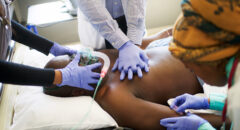
Eve Walker was 12 when her 16-year-old sister Louise collapsed at a party and died on the dance floor.
Sixteen years later, in 2002, Walker had a heart attack.
She’d been having shortness of breath and dull chest pains for several days. But it wasn’t until she began having pain in her leg that traveled up her side and arm, and then into her face and jaw that she frantically called a neighbor for help.
They rushed to a Detroit hospital, where Walker was diagnosed with a heart attack and ultimately hypertrophic cardiomyopathy, a condition she unknowingly shared with her sister. The condition, which is often inherited and causes the walls of the heart to thicken, is a common cause of sudden cardiac arrest in young people.
Her doctor recommended she get an implantable cardioverter defibrillator, or ICD, to shock her heart should a life-threatening rhythm ever occur. But being unwilling to fully accept what had happened, Walker chose not to receive the device and hoped medication and a change in diet and exercise would suffice.
“What’s super amazing to me is, I was a dancer most of my life, and there were times when I felt really slow or needed a second wind,” said Walker, now 43 and living in Los Angeles. “I didn’t feel like I had the stamina of everybody else, but I never ever put this together like something’s wrong.”
A year after her heart attack, Walker moved to California to work as a comedic actress. It was there she learned her sister had died from heart disease, something that her family had never discussed. Her cardiologist made the discovery after going over her family history and asking Walker to get a copy of her sister’s death certificate.
Fortunately, none of Walker’s children or other siblings have the condition, which affected her mother and maternal grandmother.
Fast forward to 2014. Having retired from the entertainment industry, Walker was about to turn 40 and wanted to do something big to celebrate. She decided it was time for a “mommy makeover.” She met with a Beverly Hills plastic surgeon who told her she would have to pass a stress test because of her heart condition.
“After a minute and 25 seconds on the treadmill I was about to faint. I was completely out of breath, completely exasperated,” Walker said.
Walker underwent a heart catheterization and doctors discovered a bent artery. That was her final wake-up call, and she had the ICD surgery within a week.
“Something remarkable happened to me,” Walker said. “I stopped having insomnia. For years, I lived in fear that I would die in my sleep. It actually gave me a sense of security.”
Walker’s son, Caleb, 20, said it was scary at times when his mom would be sick or hospitalized. Once, a doctor told him to say his goodbyes because she might not live.
“I think she did a remarkable job staying positive and maneuvering through that situation,” he said. “It’s very inspiring.”
She’s really living her life now, he said.
Walker’s scar on her chest reminds her she is a survivor.
For a long time, she didn’t want anyone to know she had heart disease. But that has changed, and she is sharing her story as a 2017 Go Red For Women national ambassador for the American Heart Association.
“I wasn’t just saying yes for me. I was saying yes for all of those women who may have been experiencing symptoms and may not have known what is going on,” said Walker, who is a consultant at a large health plan organization and also a certified life coach.
“It’s been one of the most amazing things I’ve done with my life. I’ve turned my pain into purpose and I’m helping people every day live their best lives in spite of the circumstances.”








